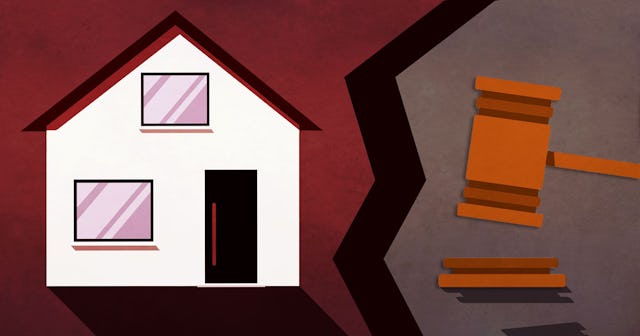Government Protections For Eviction Are Gone — What This Means For Struggling Renters

August 1st was this past Sunday, and for most of us, that date simply meant that we were halfway through summer, and that much closer to getting our kids out of the house and back to school (please, God, don’t let Delta ruin this for us all!).
But for millions of Americans, August 1st meant one thing and one thing only: rent was due, and there was no money to pay it. And for the first time since the pandemic started, millions of Americans are facing eviction due to missed rent payments. That’s because past Saturday, the moratorium on evictions was lifted, with no plans for it to be reinstated.
How Did We Get Here?
According to The New York Times, the CDC put a moratorium on rent evictions back in September due to the mass unemployment brought on by the pandemic. This moratorium was pushed forward a couple of times, and the Biden administration had extended it by one month already.
However, the Supreme Court ruled that there could be no extensions of the moratorium past July. Our favorite justice in the world (sarcasm very much intended), Justice Brett Kavanaugh, explained the reasoning for this: “In my view, clear and specific congressional authorization (via new legislation) would be necessary for the CDC to extend the moratorium past July 31.”
The Biden administration tried going to Congress, urging them to pass new legislation to extend the eviction moratorium. But Congress wasn’t able to do anything about it, and was about to go on August recess.
I’m sorry, but could they not postpone their precious vacations to ensure that millions of Americans would not get kicked out of their homes?
Thankfully, some members of Congress agreed, and urged their members to stay behind and work on this. Congresswoman Cori Bush, who had herself experience homelessness and eviction, protested on the Capital all weekend, even sleeping outside overnight.
Sadly, though, Congress didn’t take up the cause, and as of midnight Saturday, the moratorium was lifted.
How This Will Impact Americans Who Can’t Afford Their Rent
While it’s not clear the exact number of people the expiration of this moratorium will affect, estimates are that it will impact several million. As the Times points out, the Household Pulse survey, released by the Census Bureau, found that 3.6 million people expected to be evicted in the next two months. Additionally, the Times reports that homeless shelters all over America have been adding extra beds as of late, preparing for the possibility of millions of evicted people and families.
This is absolutely tragic.
In addition to homelessness, families who had been protected by the eviction moratorium also have to face the fact that they will owe their landlords back payments in rent. That’s because while the rent eviction moratorium prevented landlords from kicking their tenants out for their inability to pay, it didn’t forgive their payments.
Michael Siluk/Universal Images Group/Getty
And while it’s true that there were federal programs set up to provide renters with funds to assuage some of their rental payments, many Americans found that there was too much red tape involved in the process, and were not able to get the funds in time to make their payments. The Times points out that landlords were also eligible for funds, but many were also not able to secure them.
It’s also important to note that many of the people facing eviction are communities of color, who have also faced some of the worst financial impacts of the pandemic, not to mention risk and suffering from COVID itself. Per Vox, a study from the Aspen Institute and the COVID-19 Eviction Defense Project found that of the almost 40 million Americans at risk of eviction, the majority were people of color. People of color are twice as likely to be renting in the first place, and are also at much higher risk of facing eviction.
Where You Can Go For Help
As USA Today shares, there are some states that have extended the eviction moratorium, including California, Washington state, Hawaii, Illinois, Maryland, Minnesota, New York, New Jersey, New Mexico, Washington, D.C. But if you live in a state that has not extended it, you can face eviction from your landlord if you aren’t able to pay your rent.
Even though the moratorium has ended, you can still apply for rental assistance through the Emergency Rental Assistance Program, a federal program run by the Department of Treasury.
In addition, many states and local jurisdictions have their own rental assistance programs. You can visit the Consumer Financial Protection Bureau website for information about how to locate local help.
There are many other ways to get rental assistance as well as housing help, including from non-profits and from local community centers. The United Way website has some helpful resources, as does The National Low Income Housing Coalition. Also, many community Facebook pages will have local resources listed as well — if not rental assistance, then help with other things such as food or utility costs.
None of what is happening with the eviction moratorium is okay, especially since the pandemic is far from over, and has gotten much worse over the past month with the steep rise in infections due to Delta. If you are struggling right now, you are not alone.
Hopefully, our elected officials will be able to offer struggling families a way out of this unacceptable mess. In the meantime, please reach out for any help or assistance that’s available to you.
Update: President Biden is expected to announce a new eviction moratorium that will cover approximately 90% of renters. This is good news, of course, but in the time between when the last moratorium lapsed and when this new one goes into effect, many Americans will have (and have been) been kicked out of their homes.
This article was originally published on